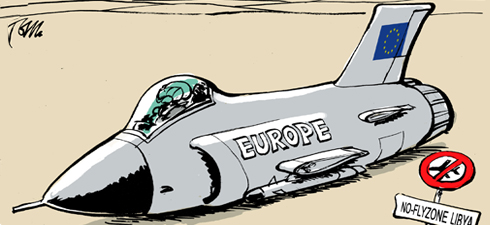"The Libyan crisis puts paid to the common external policy of the European Union," complains Slate.fr. The news website points out that the EU’s High Representative for Foreign Affairs, Catherine Ashton, and the External Action Service "with its 6,000 staff and embassies all over the world," which were both ushered in by the Lisbon Treaty, have failed to live up to expectations.
Slate reports that Baroness Ashton, who “has been conspicuously absent in the course of the Arab uprisings, has been reluctant to take the initiative, because as she herself has candidly explained: she cannot comment on events without consulting the foreign ministers of member states and establishing a position that is acceptable to all of them. Most of the time this amounts to the lowest common denominator. As a result, the definition of a ‘European’ position, as it has been in the past, has been left to the leaders of member states, and in particular the larger ones. For example, when they decided to take a stand on Egypt, Nicolas Sarkozy, Angela Merkel and David Cameron published a common declaration and other EU countries were left with a choice of either rallying to the cause or expressing their bad humour by keeping silent."
In abstaining on the issue of the use of force against Libya at the UN Security Council, Slate argues that Germany undermined the interests of the EU. "The Germans later explained that their abstention amounted to approval, but the damage was done (…) What will be remembered is that Germany broke rank with its European partners in France and the UK, and its traditional American ally. In so doing, the country placed itself in a situation similar to the one that occurred in 2003, when Chancellor Gerhard Schröder, who was at the head of a Red-Green coalition, opposed the American intervention in Iraq. However, the difference is that at the time, Berlin’s position was aligned with the one in Paris. Europe was divided but Germany was not out on a limb. Today, its abstention at the Security Council has placed it in the same category as Russia and China."
How many votes would they have lost by taking a stand for the common good?
Berlin’s refusal to authorise the use of force in Libya is not without its critics in Germany. “Merkel has isolated Germany,” headlines Handelsblatt. The business daily remarks that over the last three weeks, the Minister for Foreign Affairs Guido Westerwelle has repeatedly insisted that "the dictator cannot stay." In the light of its abstention in the security council vote, the newspaper’s columnist Josef Joffe points out this amounts to "Demanding the ‘end’ without providing the ‘means’.” He goes on to wonder how are we supposed to interpet this attitude: is it "Realpolitik? 'Square the circle without using a ruler’? Hypocrisy?”
Joffe is not convinced that the large number of regional elections in Germany can justify Berlin’s wishy-washy position: “how many votes would they have lost by taking a stand for the common good along with the rest of the world?” “In this case, solidarity amounts to little more than the will to exert an influence," remarks Joffe. So we can either say goodbye to a common foreign policy or content ourselves by sending a note to say: 'Dear Arab friends, we wish you good luck in your bid for democracy, and our condolences if you do not succeed'.”
“Germany’s rebuff to the Europeans, the Americans and the Arabs is condescending, stubbornly isolationist, and strategically confused,” announces Welt am Sonntag. In abstaining in New York, "Germany has not only discredited itself as a reliable pillar of global security policy,” notes the conservative newspaper, it has also “ put paid to the fiction of an EU foreign policy on an issue of major global importance."
Was this article useful? If so we are delighted!
It is freely available because we believe that the right to free and independent information is essential for democracy. But this right is not guaranteed forever, and independence comes at a cost. We need your support in order to continue publishing independent, multilingual news for all Europeans.
Discover our subscription offers and their exclusive benefits and become a member of our community now!












